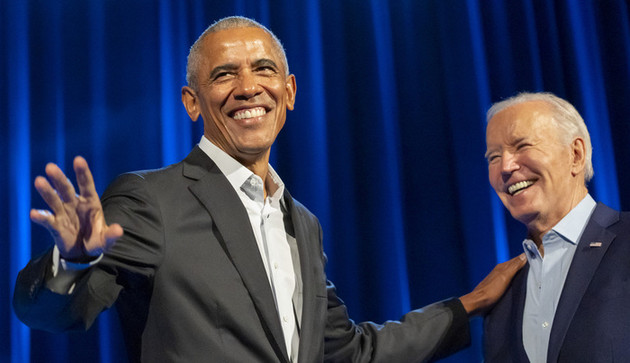A former Democratic insider reveals Obama’s impact on the Biden-Harris administration
A former Democratic National Committee (DNC) official recently confirmed what many Americans have suspected for years—that the Biden administration is largely a continuation of former President Barack Obama’s policies and influence. Lindy Li, a former DNC fundraiser, shared these insights during an interview on the “Shawn Ryan Show,” fueling ongoing debates about Obama’s role behind the scenes in President Biden’s administration.
A “Third Term” for Obama?
Li revealed that Obama’s influence within the Biden administration is much more significant than the public has been led to believe. She suggested that Biden’s presidency, in many ways, functions as a “third term” for Obama, pointing to the many key figures from Obama’s era who are still deeply involved in decision-making.
“There are so many holdovers from the Obama years still running things behind the scenes,” Li stated. “It’s no surprise that many of the policies we see today closely resemble those from 2008-2016.”
Her remarks align with the long-standing suspicions of conservatives and political analysts who have noted the similarities between Biden’s leadership and Obama’s policies, particularly in terms of personnel choices, governing style, and policy decisions.
Key Figures Tying Obama and Biden Together
Numerous officials from the Obama administration have maintained significant positions in Biden’s government, further reinforcing the notion that Biden’s presidency is essentially an extension of Obama’s leadership. Notable individuals include:
- Susan Rice: Former National Security Advisor under Obama, who later became Biden’s Domestic Policy Advisor before stepping down in 2023.
- Ron Klain: Chief of Staff for both Biden and Obama.
- Antony Blinken: Secretary of State under Biden, previously Obama’s Deputy National Security Advisor.
- Jen Psaki: Former White House Press Secretary under Biden, who also served in the Obama administration.
- Jake Sullivan: National Security Advisor for Biden, who held key roles in Obama’s government.
These individuals, among others, have been instrumental in shaping the policies of the Biden administration, which, according to many observers, reflect Obama-era priorities and approaches.
Obama’s Own Words Back the Theory
The idea that Biden’s presidency is a continuation of Obama’s leadership isn’t new. In fact, Obama himself has hinted at this possibility. In a 2020 interview with CBS’s Stephen Colbert, Obama joked about the idea of a “third term” under Biden, saying:
“I used to say, if I could make an arrangement where I had a stand-in, a frontman or frontwoman, and they had an earpiece in, and I was just in my basement in my sweats looking through the stuff, and then I could deliver the lines, but somebody else was doing all the talking and ceremony, I’d be fine with that.”
For many critics, Obama’s words seemed almost prophetic, as they appear to align with the situation in the White House today.
Policy Continuity Between Obama and Biden
In addition to the personnel overlap, many of Biden’s policies mirror those of Obama’s administration, particularly in the areas of:
- Foreign Policy: The Biden administration has largely followed the strategies laid out by Obama, especially in relation to Iran, China, and Ukraine.
- Healthcare: Biden has continued to expand the Affordable Care Act (Obamacare), a major achievement of Obama’s presidency.
- Economic Policies: Biden’s economic policies, including his approach to taxation and economic recovery, closely resemble those of Obama.
- Social and Environmental Issues: Issues like climate change, racial equity, and social justice remain central under both administrations.
Why This Matters
The ongoing debate about Obama’s influence in the Biden administration is not just a partisan talking point; it has serious implications for leadership and governance in the U.S. If Biden is heavily influenced by Obama’s network, it raises concerns about transparency and accountability in decision-making.
Some political analysts suggest that due to Biden’s age and reported cognitive decline, he may not be the primary decision-maker. This would mean that the real power in the White House lies with Obama-era officials, suggesting that Biden’s presidency may not be forging its own path, but rather operating under frameworks set by his predecessor.
Conservative Criticism and Concerns
Many conservative voices have long argued that Obama’s influence extends far beyond his two terms in office. They see Biden as a figurehead, with much of the power resting with former Obama officials and Democratic power brokers. Lindy Li’s comments lend credibility to these claims, reinforcing skepticism about Biden’s independence as president.
Fox News commentator Tucker Carlson, for instance, referred to the situation as Obama’s “third term,” emphasizing the continuity of policies and personnel. Republicans have also pointed to the similarities in how both administrations have managed crises, from border security to inflation to foreign policy issues.
The White House’s Response
The Biden administration has consistently rejected claims that Obama plays a significant role in shaping current policies. White House officials have insisted that Biden is fully in charge and that his leadership is independent from Obama’s influence.
However, the continued presence of key Obama-era figures in the Biden administration, coupled with Li’s confirmation of behind-the-scenes involvement, suggests that Obama’s legacy is not just a historical influence but an active force in U.S. politics today.
Conclusion
Lindy Li’s revelations on the “Shawn Ryan Show” reinforce what many Americans have suspected: that Biden’s presidency is, to a large extent, a continuation of Obama’s leadership. Whether this is seen as a positive evolution or a sign of Biden’s limited autonomy depends largely on one’s political perspective. Regardless, it is clear that the Obama-Biden connection remains a defining feature of the current administration, shaping its policies, personnel choices, and direction. As the 2024 election approaches, this dynamic is likely to become a focal point in political debates, with conservatives continuing to question who is truly in charge at the White House.
